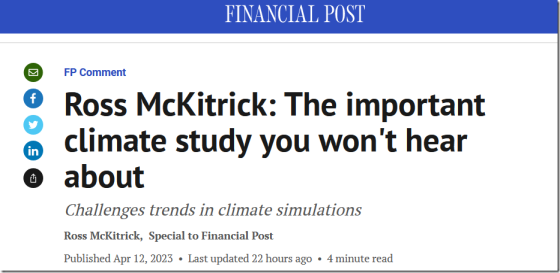by R. MCKitrick, Apr 13, 2023 in ClimateChangeDispatch
An important new study on climate change came out recently. I’m not talking about the Intergovernmental Panel on Climate Change (IPCC) Synthesis Report with its nonsensical headline, “Urgent climate action can secure a liveable future for all.”
No, that’s just meaningless sloganeering proving yet again how far the IPCC has departed from its original mission of providing objective scientific assessments. [emphasis, links added]
I’m referring instead to a new paper in the Journal of Geophysical Research-Atmospheres by a group of scientists at the U.S. National Oceanic and Atmospheric Administration (NOAA) headed by Cheng-Zhi Zou, which presents a new satellite-derived temperature record for the global troposphere (the atmospheric layer from one kilometer up to about 10 km altitude).
The troposphere climate record has been heavily debated for two reasons. First, it’s where climate models say the effect of warming due to greenhouse gases (GHGs) will be the strongest, especially in the mid-troposphere.
And since that layer is not affected by urbanization or other changes to the land surface, it’s a good place to observe a clean signal of the effect of GHGs.
Since the 1990s the records from both weather satellites and weather balloons have shown that climate models predict too much warming.
In a 2020 paper, John Christy of the University of Alabama-Huntsville (UAH) and I examined the outputs of the 38 newest climate models and compared their global tropospheric warming rates from 1979 to 2014 against observations from satellites and weather balloons.
All 38 exhibited too much warming, and in most cases, the differences were statistically significant. We argued that this points to a structural error in climate models where they respond too strongly to GHGs.
But, and this is the second point of controversy, there have also been challenges to the observational record.
…
…
by P. Homewood, Apr 13, 2023 in NotaLotofPeopleKnowThat

An important new study on climate change came out recently. I’m not talking about the Intergovernmental Panel on Climate Change (IPCC) Synthesis Report with its nonsensical headline “Urgent climate action can secure a liveable future for all.” No, that’s just meaningless sloganeering proving yet again how far the IPCC has departed from its original mission of providing objective scientific assessments.
I’m referring instead to a new paper in the Journal of Geophysical Research-Atmospheres by a group of scientists at the U.S. National Oceanic and Atmospheric Administration (NOAA) headed by Cheng-Zhi Zou, which presents a new satellite-derived temperature record for the global troposphere (the atmospheric layer from one kilometre up to about 10 km altitude).
The troposphere climate record has been heavily debated for two reasons. First, it’s where climate models say the effect of warming due to greenhouse gases (GHGs) will be the strongest, especially in the mid-troposphere. And since that layer is not affected by urbanization or other changes to the land surface it’s a good place to observe a clean signal of the effect of GHGs.
Since the 1990s the records from both weather satellites and weather balloons have shown that climate models predict too much warming. In a 2020 paper, John Christy of the University of Alabama-Huntsville (UAH) and I examined the outputs of the 38 newest climate models and compared their global tropospheric warming rates over 1979 to 2014 against observations from satellites and weather balloons. All 38 exhibited too much warming, and in most cases the differences were statistically significant. We argued that this points to a structural error in climate models where they respond too strongly to GHGs.
But, and this is the second point of controversy, there have also been challenges to the observational record. Christy and his co-author, Roy Spencer, invented the original method of deriving temperatures from microwave radiation measurements collected by NOAA satellites in orbit since 1979. Their achievement earned them numerous accolades, but also attracted controversy because their satellite record didn’t show any warming. About 20 years ago scientists at Remote Sensing Systems in California found a small error in their algorithm that, once corrected, did yield a warming trend.
…
La géologie, une science plus que passionnante … et diverse

